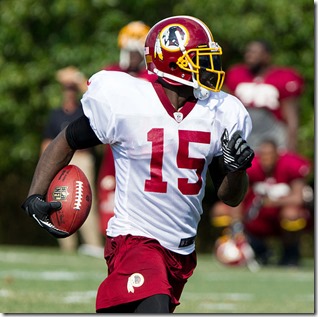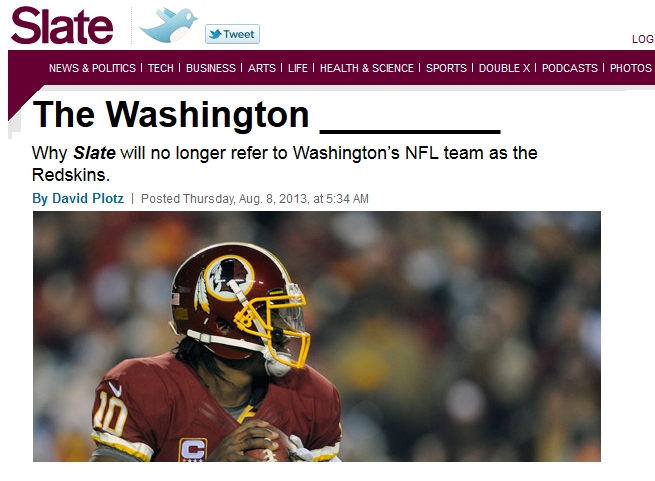Should The Washington Redskins Change Their Name?
Imagine a professional sports team called the “Newark Negroes.” If the year was 1913, that name might make historical sense. But if they were still playing in 2013? It’s actually unfathomable—it couldn’t happen, and it wouldn’t be tolerated by American society.
And yet, each week, fans gather at FedEx Field in Landover, Maryland to cheer on their hometown Washington Redskins—a name that many consider just as offensive.
If you’re not familiar with the historical baggage carried by the term “Redskins,” here’s how Josh Katzenstein of The Detroit News summarized it:
“In 1755, when the United States was just 13 colonies, Spencer Phips, lieutenant governor of the Massachusetts Bay Colony, called for British settlers to kill Native Americans who resisted.
Instead of bringing the bodies of the Penobscot Indian Nation — who lived in what is now Maine — as proof of the slaying, settlers could return instead with scalps of the men, women and children they attacked, and those “red skins” earned them as much as 50 pounds.”
A poll of Washington, D.C.-area residents conducted by The Washington Post in July (margin of error 4.5 percent) found that only 28 percent of respondents thought the team should change its name. But interestingly, 56 percent of people acknowledged that the term was offensive to Native Americans, and 88 percent of people said a name change would have no impact—or a positive impact—on their support for the team.
That suggests that most people know it’s an offensive name but are reluctant to change it due to their own, positive associations with the team. I can understand that. I grew up in Maryland and rooted for my hometown ‘Skins for many years. Changing the name would feel, in part, like it would partially erase my fond memories of Sundays in the stands at the old RFK Stadium.
Nonetheless, it’s still the right thing to do.
This issue is quickly becoming a big crisis for the team. Earlier this month, Sports Illustrated columnist Peter King said:
“I’ve decided to stop using the Washington team nickname. It’s a name you won’t see me use anymore. The simple reason is that for the last two or three years, I’ve been uneasy when I sat down to write about the team and had to use the nickname…Some people, and some Native American organizations…think the nickname is a slur…I can do my job without using it, and I will.”
Mr. King isn’t alone. According to the BBC, at least five news organizations refuse to use the word “Redskins” in their reporting: The Washington City Paper, the Kansas City Star, Slate, New Republic, and Mother Jones. And certain reporters at USA Today, the Philadelphia Daily News, Buffalo News, and The Washington Post also refuse to use it.
For his part, Redskins Washington NFL franchise owner Daniel Snyder says he will never change the team’s name. Never.
In fairness to Snyder, changing the team’s name could cost the team many millions of dollars. The “Redskins” brand name took decades to build, and changing it could compromise some of its brand equity. But the question is at what point that business loss becomes the less expensive of the two options. If reporters increasingly refuse to use the team’s name, the name “Redskins” would surely lose some of its brand equity anyway. And if the name becomes more stigmatized, you might find fewer fans buying Redskins memorabilia for themselves and their kids.
There’s a good precedent here, and it also comes from Washington, D.C. sports. In 1995, the owner of the Washington Bullets basketball team, Abe Pollin, decided to change the team’s violent-sounding name—a name change he thought appropriate since Washington, D.C. had such a high crime rate.
Pollin ran a contest and allowed fans to decide the new name; fans renamed the team the “Washington Wizards.” If public sentiment continues moving swiftly against Dan Snyder’s Redskins, he might consider using a similarly fan-based approach to rename his team.
[poll id=”35″]
Please leave any additional thoughts in the comments section below.
Photo Credit: Keith Allison, Wikimedia Commons





First, a couple of caveats. I have Native American heritage, and my son (through his mother) is eligible to be a registered member of the Cherokee Nation. A good friend grew up on a reservation in Oklahoma. I have also done pro-bono work for the Moapa Paiute tribe in Southern Nevada, helping them with educational issues for their children, among other things.
All that to say that I’m not anti-Native American. Far from it.
I’m also a native of Cleveland, home of the Indians, and I grew up in Atlanta, home of the Braves. As someone acutely aware of my heritage at that time, I felt these names were a tribute to my proud warrior heritage, and nothing in the intervening years has caused me to change that. These names were not created to mock a minority – they were created to imbue the team with the appearance of aggressiveness and bravery that are traditional views of Native Americans. You have to bend and twist reality to take what was clearly meant as an honor and turn it into an insult.
Finally, as a professional marketing communicator, I understand brand equity and the value of a name. The “Redskins” (like the “Indians” and the “Braves”) has strong, even generational equity that has a huge market value. An owner would be risking a lot to change the name. If the company was investor owned, those investors could legitimately raise issues of fiduciary responsibility if an team executive acted to change the name.
The “Washington Bullets” isn’t a comparable issue, though the author wanted to make it so. The team had existed for less than 30 years when its name was changed, and Washington was never a “basketball town” – but it has always been a “football town.” By counterpoint, the Redskins’ franchise has existed since 1932, with that name in use since 1933 – 80 years, rather than 29 years – which is a huge difference in terms of brand equity. Beyond that, “Bullets” name doesn’t evoke the heritage of bravery that comes with the name “Redskins.”
So the economic/branding risk was far less for the Bullets, and the potential rewards far greater – to the point that these two examples are not comparable.
If there was some huge Native American outpouring of feelings about this name, it might be worth considering a name-change, but that has never been the case. Native Americans fall into three broad categories – those who would like to see the name change, those who are proud of the name and would like to keep it, and those (the vast majority) who are oblivious to the issue, which has no meaning for them.
Clearly, that would not be the case if there was a “Newark Negroes” team (the straw man this author raised to try to make this an offensive racial issue). But because Redskins isn’t by any means seen as universally offensive by those supposedly offended by the name, there is no broad outcry. And the reason (a combination of support for the name and apathy over the issue) should say it all.
The name has value, and should not be changed for the reasons cited by the author. If the owners change it, that should be for positive business reasons, not out of fear of not being seen as PC enough. That journalists are now starting to pile on a self-generated bandwagon to stop using the name out of faux-outrage is not sufficient reason to even consider changing the name.
Ned Barnett – Nevada
Dear Ned,
Thank you for your smartly argued counterpoint about the name “Redskins.”
Since I’ve already presented my view, I won’t respond point-by-point. But I would like to respond to one thing regarding this being an issue of political correctness. Let’s say, for the sake of debate, that everything you wrote is correct. If reporters — even if they’re acting out of political correctness — refuse to use the team name in their articles, radio talk shows and television reporters, won’t that have a negative impact on the team’s brand equity? (And I’d argue that fewer people are apathetic on this issue than they were even a year ago, and we could be on the cusp of a tipping point with many more reporters refusing to use the team name).
And the corollary of that point is this: If the name “Redskins” becomes increasingly stigmatized, I could see parents refusing to buy jerseys, hats, and other Redskins memorabilia for themselves and their families. That, too, could have a big financial impact on the team.
In pure financial terms, I agree with you: keeping the name is the fiscally responsible move. For now. What I’m arguing is that that may not be the case forever.
Thanks again,
Brad
PC crap… way, to take an issue of whether Redskins is even a derrogatory term, and quickly make it appear that it comes from the most abhorent practice of scalping….
The is much more gray then you make it appear…
Only PC white people and a small minority of Native American people care about this subject…
and if the name is changed, I hope it is to Whiteskins, or Caucasions,,, I would love some gear
Smith,
Thank you for comment. I’m sorry to hear you’d be proud to walk around with the name “Whiteskins” on your jersey, as that seems rather reactionary and antagonistic.
That aside, I would remind you of the stats of residents from the Washington, D.C. area: According to The Washington Post, “56 percent of people acknowledged that the term was offensive to Native Americans, and 88 percent of people said a name change would have no impact—or a positive impact—on their support for the team.”
You may not agree with those people, but it does make the point that people may be more offended by the term than you’re inclined to believe.
Best,
Brad
Tell mr Pollin that the name wizards is extremely offensive to me as it connotates
evil and I don’t think that name to be mentioned anywhere. a wizard is a so called demon that evokes spells and that crap so it is very offensive to anyone who thinks about it at all.
I don’t think the “Redskins” name should be changed. I think it is an honor instead of being offensive. And what about the baseball teams named the “Indians” and the “Braves”! I’m just saying!